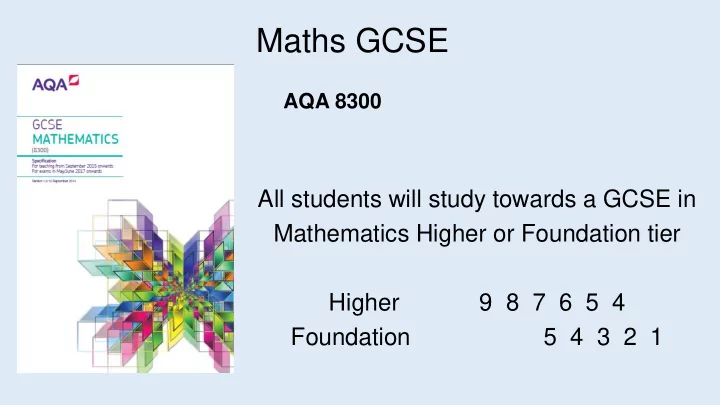

Maths GCSE AQA 8300 All students will study towards a GCSE in Mathematics Higher or Foundation tier Higher 9 8 7 6 5 4 Foundation 5 4 3 2 1
Eight things you need to know about the new GCSE 1. It’s bigger 2. There’s more content at both tiers 3. There are new Assessment Objectives 4. There are more formulae that pupils will need to memorise for the exams 5. There are more examination papers for pupils to take 6. The structure of the papers has changed 7. There’s a new grading system 8. The assessments will be more demanding
2. There’s more content at both tiers – New to Foundation • Surds • Reverse percentages • Factorising quadratics • Trigonometry – the sine, cosine and tangent ratios, including to know the exact values of sin, cos and tan 30 ° , 60 ° and 45 ° • Using an inequality to specify error intervals due to rounding • Circle properties • Vectors • Tree diagrams • Standard form • Compound interest • Simultaneous equations • Direct and inverse proportion • Fractional scale factors of enlargements • Conditional probability and tree diagrams • Frequency trees • Venn diagrams • Fibonacci type sequences, quadratic sequences, geometric progressions
2. There’s more content at both tiers – New to Higher • The gradient at a point on a curve as a rate of change • The area under a graph • Geometric progressions • Composite and inverse functions • Iteration • The location of turning points on a quadratic function by completing the square • Expanding products of more than two binomials
3. There are new assessment objectives • Less rote learning more on problem solving • Multi-step solutions • Less clearly structured questions • More open ended questions • Real life contexts
4. There are more formulae that pupils will need to memorise for the exams
5. There are more examination papers for pupils to take
6. The structure of the papers has changed
7. There’s a new grading system Top 3% of pupils who currently get an A* will achieve a 9 7 is anchored to old A New maths GCSE 5 is set between B and C grades 4 is anchored to old C 1 is the old F and G
8. The assessments will be more demanding – foundation question More questions involving reasoning and problem solving
8. The assessments will be more demanding – higher question
Maths at QES • Devised a 7- 11 scheme of learning • Building new content into the curriculum eg Venn diagrams, function notation…. • Rewritten all the internal exams at KS3 and KS4 • Back to basics with numeracy skills • Pupils issued with notebooks to help focus and revision • Constantly reviewing what we do and how we do it. • 90% A* - C for the last 3 years
Written Methods
Be equipped
What can you do to help? • Talk about numbers • Real life situations: shopping, offers, best buys, interest rates, cooking times, bills • Mental maths: the more automatic responses that pupils can accurately recall ‘I was never very good at Maths …’ the better • Discuss problem solving strategies: drawing Be positive diagrams, underlining important facts and reading questions carefully can all help • Does their answer make sense? Estimating as a checking strategy is useful
Resilience
Confidence
Recommend
More recommend